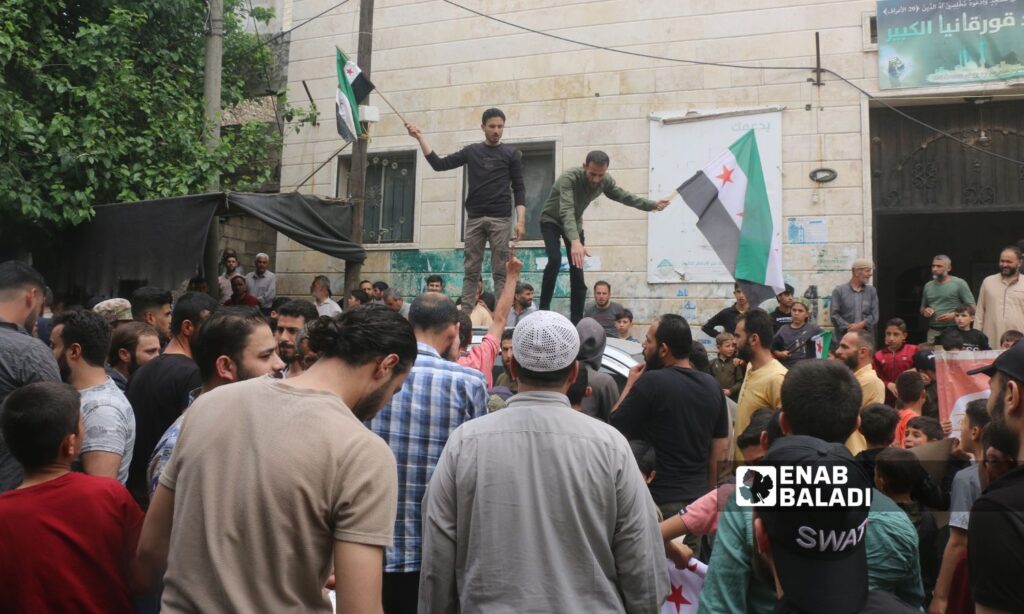Today, Friday, April 26th, scattered demonstrations took place in Idlib and its countryside rejecting the policy of Hayat Tahrir al-Sham (HTS) and demanding the overthrow of the faction leader Abu Mohammad al-Jolani.
Enab Baladi‘s correspondents in Idlib reported that demonstrations took place after Friday prayers in central Idlib and in the cities and towns of Atmeh, Jisr al-Shughour, al-Atarib, Batbo, Maarat Misrin, Hazano, Qourqenia, Salqin, and Sarmada.
The first demand of the protesters is to overthrow al-Jolani, to reject the policy of monopolizing decisions, to remove the military from managing civil affairs, and to release all detainees, considering that the reforms conducted by Tahrir al-Sham and its political umbrella, the Syrian Salvation Government (SSG) do not meet their aspirations and demands.
The ongoing popular movement, which has lasted for 60 days, is led by civil activists and supported by military and legal authorities, especially after torture incidents in the prisons of Tahrir al-Sham became public since last February.
Protesters in Qourqania in the northern countryside of Idlib demand the overthrow of the leader of Hayat Tahrir al-Sham, Abu Mohammad al-Jolani – April 26, 2024 (Enab Baladi/Iyad Abdul Jawad)
Reforms do not stop protests
Since February 26, Tahrir al-Sham has faced a peaceful movement and demonstrations from civilians, activists, military personnel, and legal authorities, demanding the overthrow of al-Jolani and rejecting the policy of decision monopoly and dominance.
The demonstrations were met with promises, reforms, and intensive meetings of al-Jolani, Salvation Government, and Shura Council, including a general amnesty for detainees with conditions and exceptions, and the formation of committees to listen to the community, canceling fees on buildings, and partial exemptions under certain conditions.
Subsequently, a package of promises came, and work began on their implementation, including reorganizing the General Security Service within the Ministry of Interior in the Salvation Government, forming a supreme consultative council to review public policies and strategic decisions in the area.
Calls were made for elections for the General Shura Council in the area, establishment of grievances and accountability offices, formation of a higher oversight agency, reviewing economic policies, combating corruption, preventing monopolies, activating the role of local councils and professional syndicates, but this did not prevent the outbreak of demonstrations.
Researchers and governance experts in a previous file prepared by Enab Baladi explained that the governance system in Idlib generally has a presidential system in all executive, legislative, and military channels, due to the influence of al-Jolani, who tries to build these authorities, and it is clear that he holds the reins of the game completely in terms of decision-making.
Bassem Hatahet, a researcher in governance affairs, considered that there are several negative aspects to this form of governance (centralization of decision), the most prominent of which is its regional, local, or international unacceptability, which is called an unstable or inflamed state or region, prone to conflict by the surrounding environment, region, or the entire international project.

